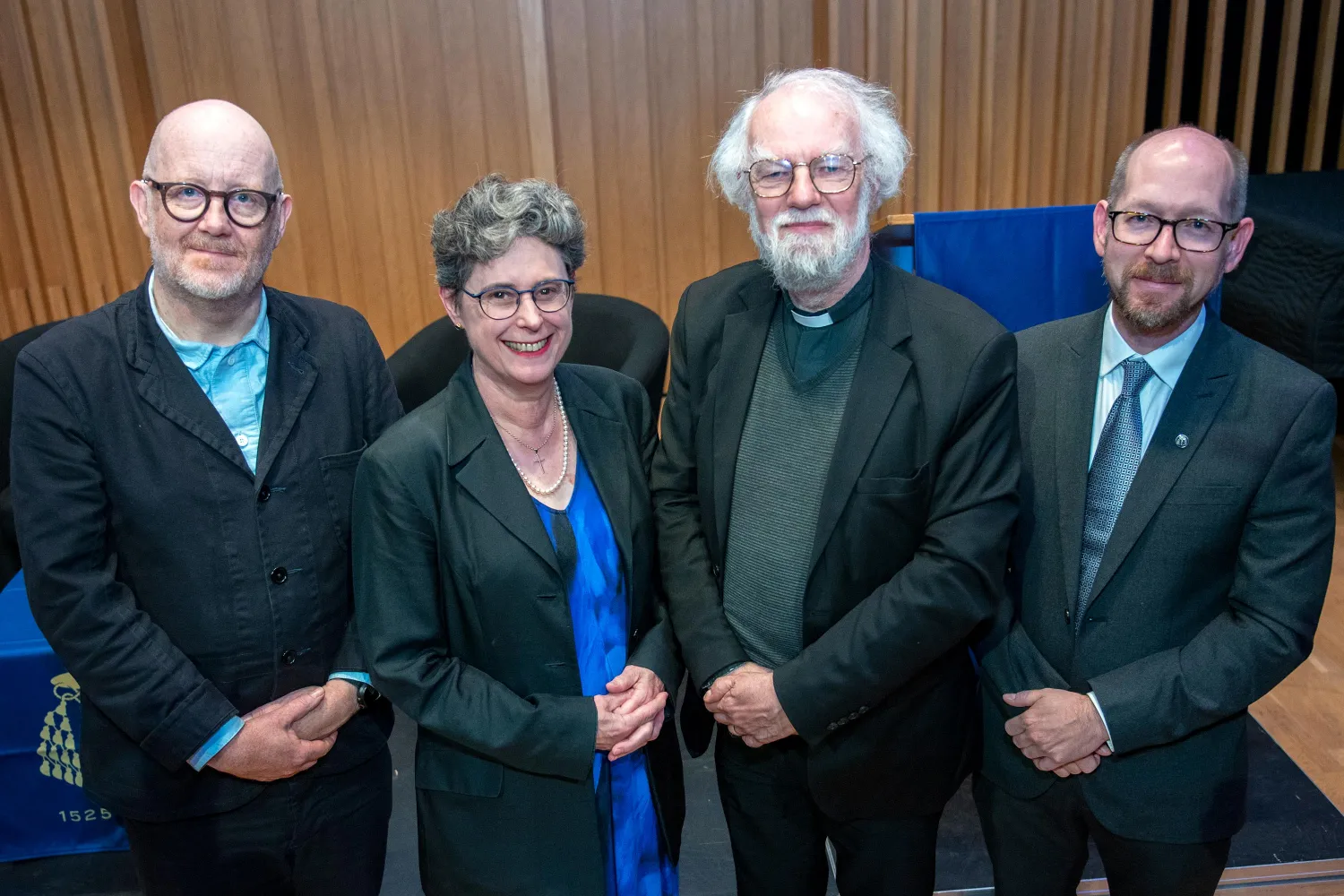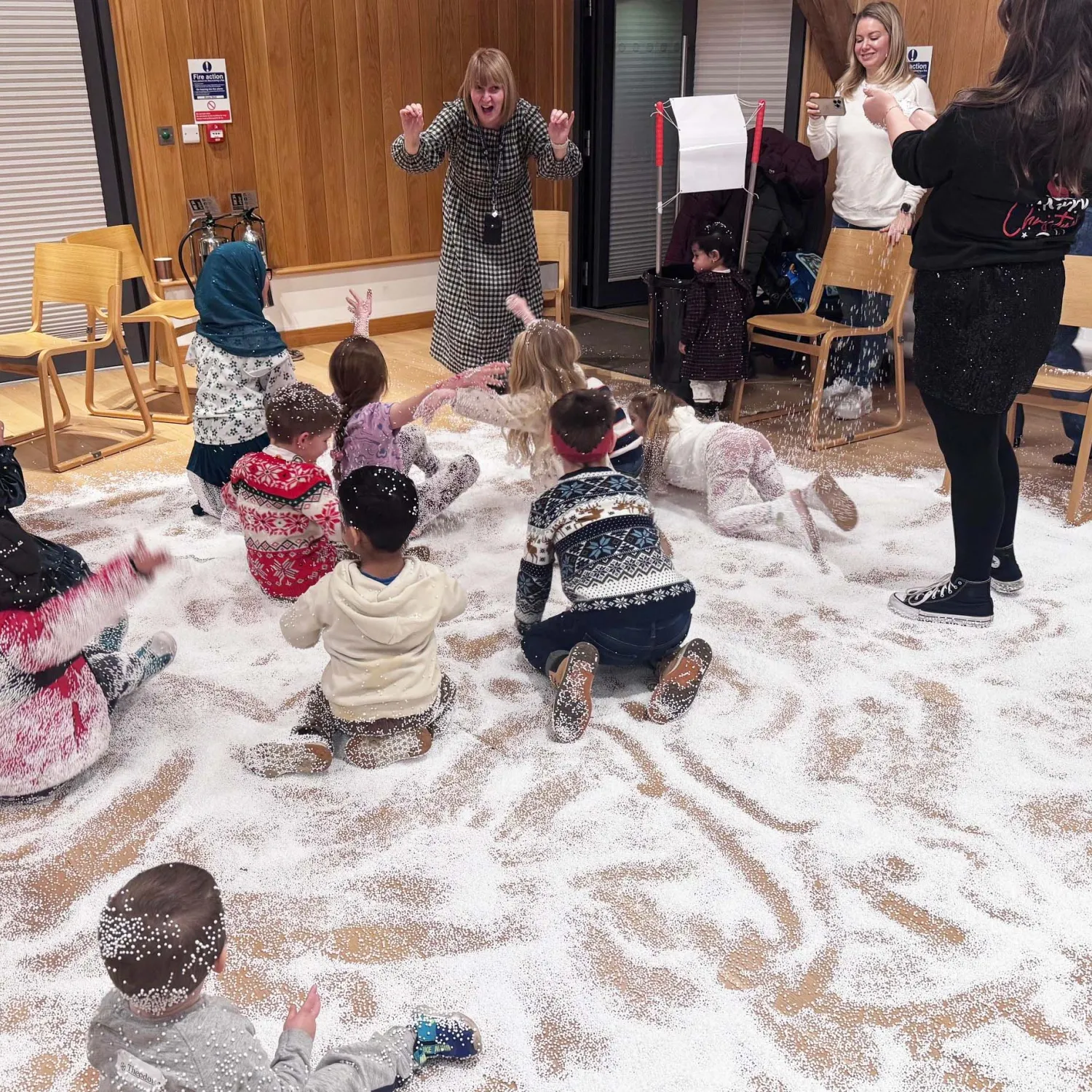Breadcrumb
Rowan Williams delivers 500th Anniversary Lecture in Manchester
Former Archbishop of Canterbury The Right Reverend Dr Rowan Williams has urged a fresh look at Renaissance humanism, arguing that its focus on conversation, persuasion and civic discourse may still provide a framework for responding to the urgent educational and societal challenges of our time.
Addressing a diverse audience of scholars, Members of Christ Church and the University of Oxford past and present, and interested members of the public, Dr Williams was the keynote speaker at an event in Manchester’s Stoller Hall – ‘Humanist Learning: A Vision for Today?’. The public lecture was the third in a global series marking the 500th Anniversary of the founding of Christ Church.
Dr Williams was joined by award-winning poet Professor Michael Symmons Roberts FRSL and theologian The Revd Professor Andrew Davison, Regius Professor of Divinity at Oxford. Together, they explored the legacy of humanism and its relevance in today’s world.
The evening began with a welcome from The Very Revd Professor Sarah Foot, Dean of Christ Church, who highlighted Dr Williams’ longstanding relationship with Christ Church, from his doctoral studies and later role as a Cathedral Canon, to his current status as an Honorary Student (fellow). Today, he remains an active theologian, writer and poet.
In his address, Dr Williams traced the historical roots of humanism, invoking Renaissance figures including Erasmus, Machiavelli, Calvin and Pico della Mirandola. Despite their differences, he noted, ‘they were all committed in their very diverse ways to rethinking the intellectual world and its boundaries in conversation with a newly revived awareness of the Classics – of Greek and Latin literature.’ This brought with it a renewed commitment to rhetoric – to writing and speaking well, and to intelligent persuasion – and to leading interlocutors sometimes to places where plain logical demonstration does not lead. ‘This means that humanism is, indeed, very much a political enterprise’, one concerned with governance and power, but which challenges arbitrary rule.
‘Isn’t it obvious?’ is one of the most lethal phrases that can be used in the intellectual world.
‘Isn’t it obvious?’ is one of the most lethal phrases that can be used in the intellectual world.
But if this is humanism, what then is humanist education? For Williams, it must be more than ‘simply acquiring a gloss of familiarity with a set of remote texts and a fluency in dead languages, quite divorced from the role of persuasion and governance’. Instead, Dr Williams urged a return to humanism’s original spirit.
In Dr Williams’ picture, modern humanist education need not be at odds with a scientific worldview, but it does compete with an uncompromising, dogmatic and arbitrary form of scientism propounded by some today. Humanism extends ‘an invitation to people to ask more consistently, more creatively, how and why some questions come to be taken as self-evident, and how taking certain issues as self-evident is one of the most effective tools of unaccountable power.’ For the humanist, ‘“Isn’t it obvious?” is one of the most lethal phrases that can be used in the intellectual world.’
According to Dr Williams, the essential role of humanism is to halt the erosion of meaning by dogmatic scientism. ‘In short,’ he said, ‘the point of dusting off the legacy of humanism is to bring to light the human in humanism’ – to bring meaning to people’s lives at a time when it is badly needed.
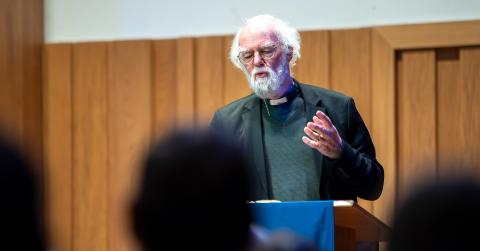
Responding to Dr Williams’ address, Christ Church’s The Revd Professor Andrew Davison – who last year became a Canon in Christ Church Cathedral and Oxford’s Regius Professor of Divinity – picked up the theme of threats faced by humanist education and warned of the ongoing loss of departments and degrees in Classics, Philosophy, English and Modern Languages. ‘We are at a critical moment in perpetuating the 16th century legacy’ of humane learning, he cautioned. He spoke of the particular need to protect language learning, which has seen especially dramatic declines. A former scientist himself, Professor Davison also stressed the value of humanist insights and learning in the sciences.
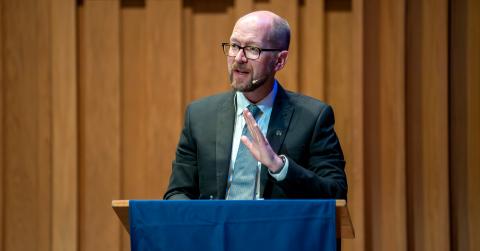
The poet Professor Michael Symmons Roberts FRSL offered another perspective on Dr Williams’ remarks. He invited the audience to consider poetry as a mode of humanist learning. ‘Poetry at its best’, he suggested, ‘aspires to explore and communicate truth in a form of language that is richly metaphorical, musical, intimate and public, embodied and metaphysical, innovative and new, yet in conversation with all the poems of the past.’
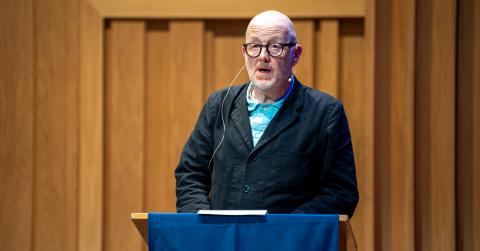
The evening concluded with a lively and fruitful Q&A session. Panellists mused on how education might be radically reimagined, how society could become, in Dr Williams’ words, more ‘dialectically alive’, and how humanism must be intentionally promoted as it comes under threat from raw power in an increasingly polarised world.
The full event can be viewed below.
The next instalment of the 500th Anniversary Lecture series takes place in New York City on 25 September. Attendees will have the privilege of hearing from Richard Stengel – former Under Secretary of State for Public Diplomacy and Public Affairs in the Obama administration and former Managing Editor of TIME magazine. See further details.
Other Christ Church news
